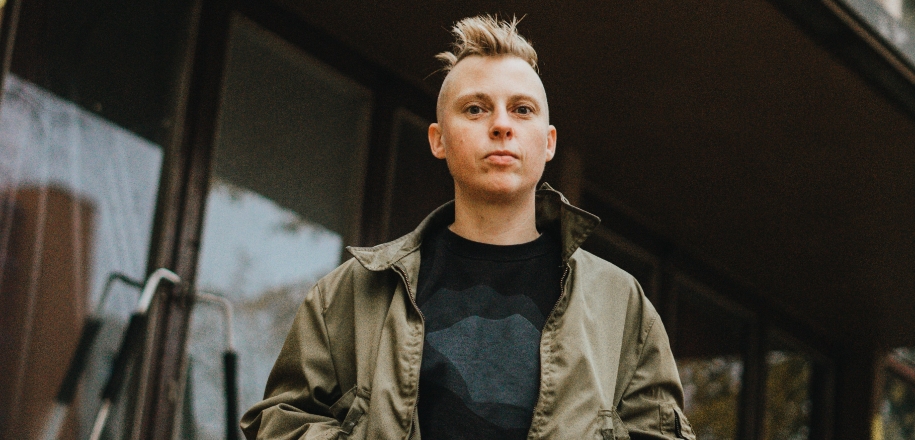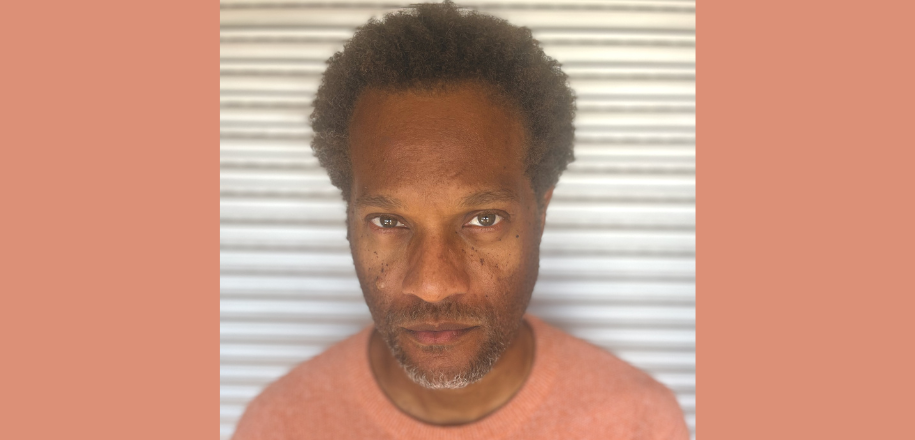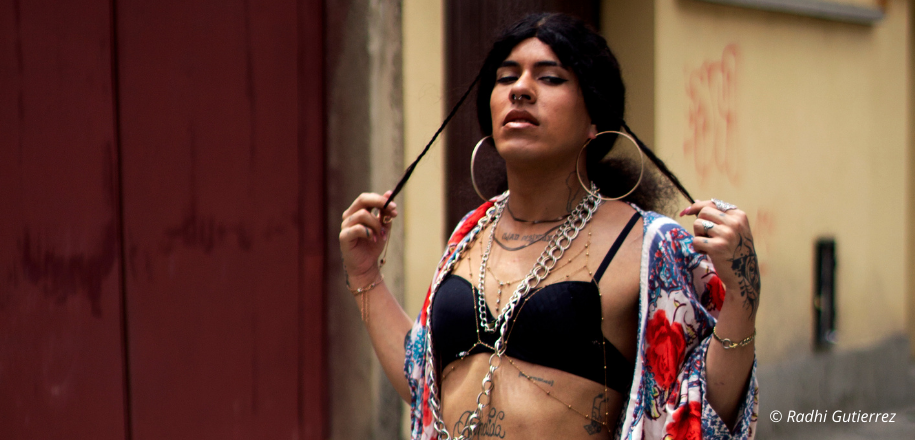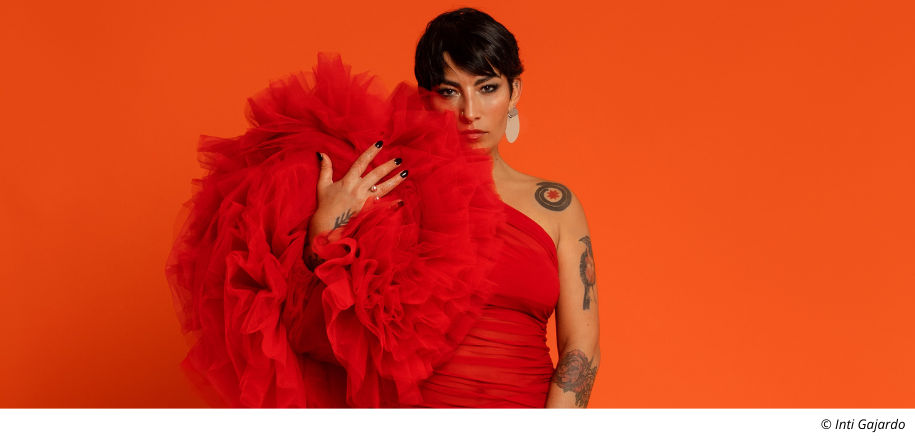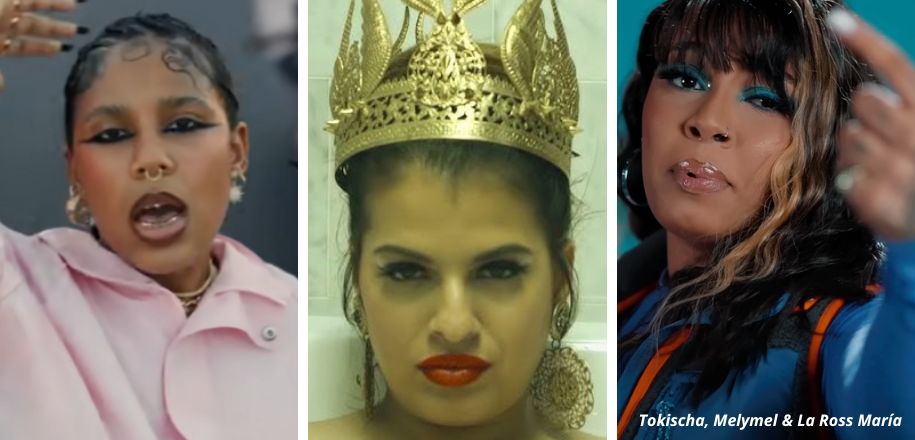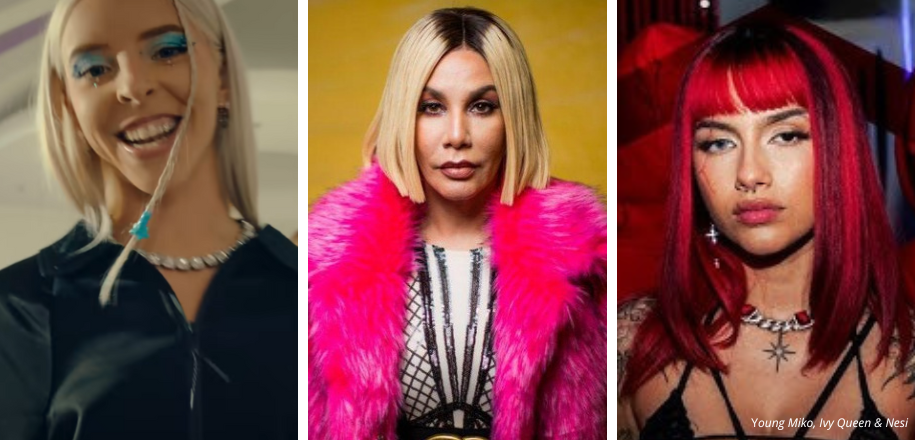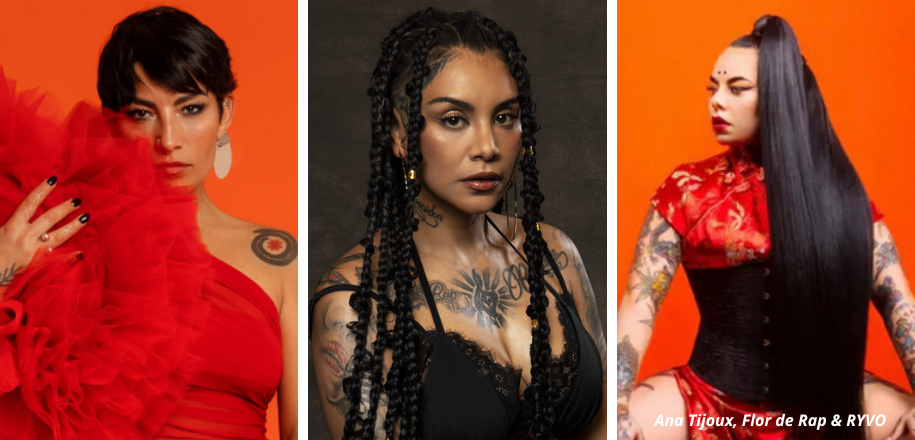As a non-binary producer, beatmaker and studio engineer, Spoke has been active on the Berlin queer rap scenes for several years. In their studio Slomo, open in 2018, they record and produce several leading German female and queer rappers.
The artist told us about their debut as a DJ, their love for hip hop culture, the issues they faced trying to find their own community and the need to create female/queer/POC-led structures in the music industry.
How and when were you introduced to hip hop for the first time?
I was introduced to hip hop during my teenage school years, in the late nineties. I had a lot of friends who listened to rap and did graffiti, so my first contact with the culture was through going to graffiti jams and listening to old school rap like: Bahamadia, Jean Grae, The Pharcyde, A Tribe called Quest, Queen Latifah, Missy Elliott, Jurassic 5, Heather B, that kind of vibe.
That is also the time I started collecting vinyls and got in touch with the instrumental side of hip hop and the art of sampling. I listened a lot to DJ Premier, J Dilla, DJ Vadim. Hip hop culture also got me in touch with jungle, drum n’ bass and UK garage. That’s when I decided to start DJing.
Why did you choose the name Spoke?
My ex-partner, who had a huge influence on me becoming a DJ, gave me this name while I made my first baby steps DJing in London.
Did you receive any musical training or education during your childhood?
Yes, I had musical training in saxophone when I was a teenager, playing in the big band of my school.
What equipment did you use at the time and what genre did you relate to?
I was a total vinyl junkie, so in the beginning I strictly played records. I then started digital DJing with Traktor and later explored producing, first in Reason and then Ableton Live.
Genre-wise, I would say that hip hop was my homebase from the very beginning. As I started to take myself seriously as a DJ, my most important influences were club styles from the UK and US (UK garage, grime, drum n’ bass, jungle, later juke and footwork). I lived for one year in London and that time completely shaped my musical identity.
“In the studios, there were 99% male producers and male engineers around.”
Who were your role models while growing up?
Ha, that’s hard to answer! I was lacking role models in general, but I particularly lacked female* and also nonbinary role models. I was conscious from an early age of my gender identity being “different”. From my early childhood on I was into things “that boys usually do”: I hung out mostly with boys, I naturally identified with the things they did.
It was the same when I started out DJing and producing: I was in all-male DJ Crews and in the studios I hung out, there were 99% male producers and male engineers around.
At the time, there were rarely female* role models to look up to. Fortunately, this started changing for me with the influence of the “Female Pressure” network in Berlin. Female* and queer producers from the house and techno scene were my first role models! At that time, the electronic music scene was way more progressive than the hip hop and bass music scene in Berlin.
You produced several independent queer and female rappers, such as Sorah, Nashi44, Finna, Alice Dee, Carmel Zoum who are all featured on Madame Rap. How did you get in touch with them? Do you scout for new artists? Is it word of mouth? How does it work?
Word of mouth, and long grown connections! Some of the MCs I collaborate with I have known for many years. Berlin is a big city, but the musical scenes aren’t that big, so our ways eventually cross in certain venues, events, and festivals, especially when doing political rap.
You have your own studio called Slomo. How did you open it and what do you do there?
I decided to start my own studio in 2018, after coming back from California where I worked as a technical director on a major music festival. This work experience gave me the opportunity to visit and work in some of the most legendary studios and theaters of Hollywood.
“I felt it was politically important to create a safer space for female* and queer artists in Berlin.”
I was super inspired by the history of studio culture in the US and by the growing US networks of female producers and engineers in the audio field.
I founded the studio because I felt it was politically important to create a safer space for female* and queer artists in Berlin and I wanted to create a business in this field that was queer-led and breaking up persistent roles in music studio culture.
My studio work is focused on vocal recording and vocal production, as well as working with artists on their music, providing them with co-producing and mixing. The rest of the time I do either instrumental production for other people or I produce my own music.
Which production or beat are you most proud of and why?
My upcoming mixtape is the work I am currently most proud of because I dare to put my own musical vision in focus. For many years now, I have been working in the background of projects – which I absolutely love doing – but I also feel the need to put my beat making in focus, and that is the idea behind my mixtape project which I will release in 2022.
This project gives me the space and format to focus on the different aspects of my beatmaking, precisely exploring and defining what type of vibe, tempo, and style I want to create.
How do you usually compose? Do you work hand in hand with the artists or on your own at first?
It totally depends! Sometimes I step into the process with more of a session approach, to see what spontaneously comes up and develops. Other times, I pre-produce and prepare different loops and versions of a same song for an artist.
As a queer artist, what issues did you have to face throughout your career?
I think I had a tough time because I was lacking a community I can identify with, being the only non-cis male & queer person in the studio most of the time, but also being so drawn to the nerdy and technical aspects of music production rather than to the performance side of it.
“For a long time, I couldn’t identify with the local mainstream hip hop scene in Berlin at all.”
Until I found my first crews, my own queer circles and role models, I always felt like an alien and an outsider. For a long time, I couldn’t identify with the local mainstream hip hop scene in Berlin at all, so I identified with the electronic music scene and those artists instead.
Today, the scene is a lot more diverse, and a lot has changed. There are enough sub-scenes for different styles and identities today. Local artists like Sookee and Lena Stoehrfaktor laid the groundwork for this.
From a French perspective, Berlin can appear like a queer paradise. What is the queer rap scene like there?
I am unbelievably thankful that these scenes of queer artists exist in Berlin! It is thanks to the work of a lot of activists, promoters, political artists, and the overall presence of queer underground culture in the city of Berlin that this is happening right now.
The way I perceive it, the Berlin queer rap scene gathers different types of queer artists: some for whom their queerness is at the center of their art, and some for whom their artist identity focuses more on the music they make rather than the fact that they identify as queer.
I am not sure I would say it’s a clearly defined “queer rap scene” only. There is a scene of artists who explicitly identify through their queerness. But then, there are also a lot of artists who are queer, and their queerness is open, but secondary for their identity. I think both developments reflect a growing freedom and are a huge achievement!
What do you think should be done to make female and queer artists more visible in hip hop?
My impression is that a lot has already changed in the last 3-4 years! Through groundbreaking artists and channels like Madame Rap or 365 MCs, sooo much more knowledge and visibility has been achieved, it is absolutely amazing! I am so glad that these resources were created!
“Some bodies and identities just do not make it on labels because they do not fit the marketing standards.”
Still, there are two main aspects I am personally missing in this development: firstly, I feel that the current “hype” of the industry pushing underrepresented artists to the forefront is not politically consequent, since only certain types of identities and femininities are pushed, that is, the ones that are marketable because they fit a certain standard.
Some bodies and identities just do not make it on labels, because they do not fit the marketing standards. Similarly, I think the tokenisation of queer and POC artists is a really dangerous trap and confines these identities to a representation and marketing performance.
At the end of the day, the same people stay in power, make money and rule the structures. I believe that real structural change can only happen if we have more female*, queer and POC owned structures and power positions in the industry. For me, equality is a lot about owning key positions to enable sustainable access to power.
“Beatmaking, sampling and turntablism are a big part of hip hop. I wish for more attention to this side of the culture.”
The second thing I am missing, is the lack of attention for us beat makers and producers. I know we are few, but hey, we are here!
In most existing hip hop media (mainstream or feminist) hip hop equates rappers. Beatmaking, sampling and turntablism are a big part of hip hop culture, and it is very much neglected in these media. I wish for more attention to this side of the culture. It’s harder for female* and queer hip hop producers to get attention and be seen as artists compared to techno or house producers. Why is that?
I think this also has to do with social gender roles in music in general. The vocalist role has traditionally always been the first role to be open to female* musicians compared to more nerdy roles like drummers/instrumentalists or engineers.
Do you consider your art and music as a political fight?
Yes absolutely. 100%. I don’t judge others and claim everyone’s art needs to be political. But my art is always political because I personally perceive the world as a very hierarchical and exclusionary place on a daily basis. For that reason, I love working with rappers whose lyrics are political too.
What are your upcoming projects?
I am currently finishing my first own producer mixtape, featuring a selection of strong female* and queer feature MCs. This has been a very important journey for me as a beatmaker through the last 12 months and releasing it this year is a fundamental step into positioning myself as a solo artist.
The second important upcoming project is that I will be working on some knowledge content for an online producer series. There will be more detail about it later this year. I am super excited about that.
What do you think about Madame Rap? What should be changed or improved?
I really appreciate this project so so much! I very much like the fact that it is not limited to a national scene or one language. The international character of it is what makes it very strong and powerful!
© Marie Poulain
Find Spoke on Instagram, Soundcloud, YouTube and their website.

